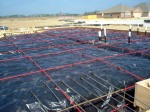Why choose home inspections as a profession? there are plenty of other fields of service a home inspector can do. We could for example be general contractors, building homes instead of inspecting them. Some can be engineers, and a few are, why? can’t be for the money or they did not have anything else to do. Some can be heating and air conditioning technicians while others electricians or plumbers. Is it the idea of working for ourselves? spending all our money on marketing and advertising, not to mention all the equipment, reporting software, website building and time away from families trying to build the business.
When I was working for a commercial concrete company I was involved with some big projects, Reliant Stadium and the Anadarko Tower in The Woodlands, TX just to name a couple, and in my fifteen years I have seen a lot of good people not make it home, in either one piece, or some not at all. When I was given the responsibility to lead a crew I took safety pretty serious, it was my men hanging over the edge of skyscrapers, and during my time everyone went home at the end of the day.
Home inspections is about a lot more than reporting on whether or not the toilet flushes and the oven works. The inspection of the electrical components are safety related inspections, a bad installation can result in burning down your house. Taking into account all the positive reasons for a home inspection (I don’t believe in negative information, it is up to the individual how it is perceived ) I believe the safe operation for the occupants of the home is the most important thing to inspect and report on, even above the standards of practice set forth by the Texas Real Estate Commission.
I chose home inspections because I have something to offer in the way of safety, and want to help others know the condition of the home there in now or the one they want to purchase.
